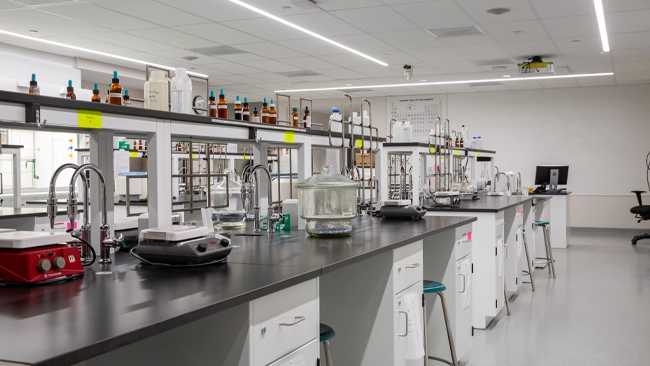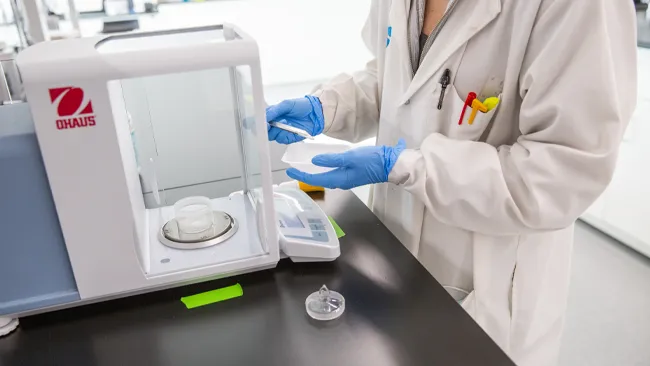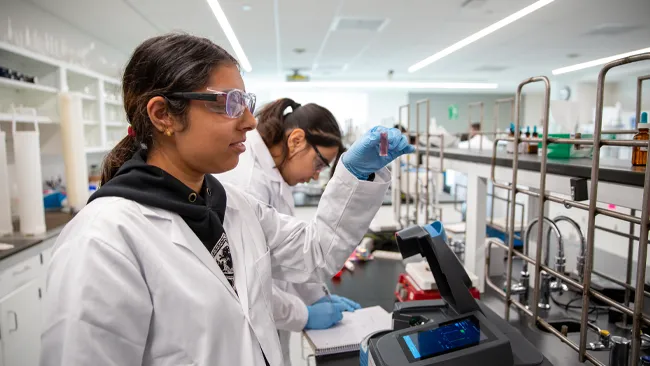
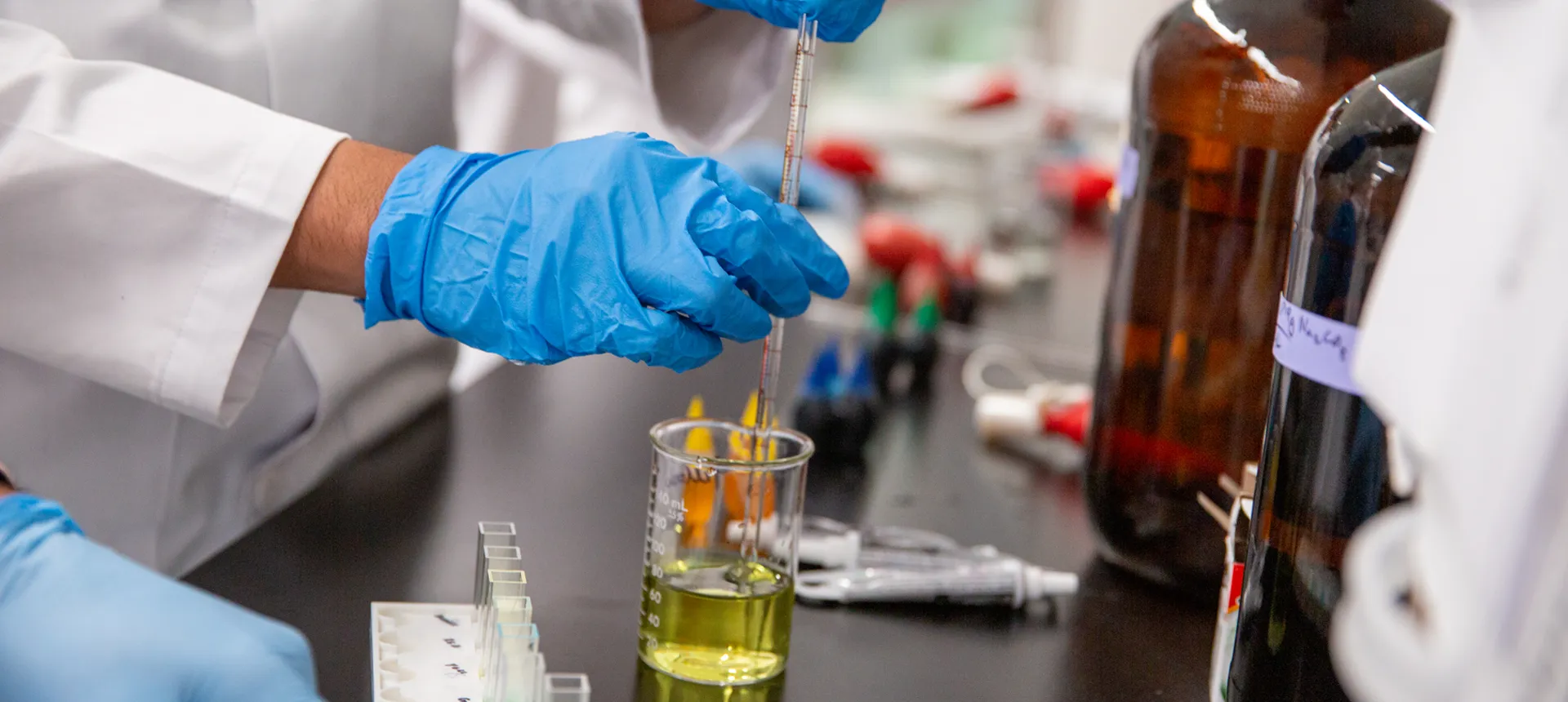
Chemical Lab Technology
Overview
Are you passionate about science and enjoy working with your hands? This may be the perfect career for you.
Chemical Lab Technologists are professionals who work in laboratories and are responsible for conducting experiments, analyzing chemical compounds, and carrying out research. They play a crucial role in various industries such as health care, agriculture, pharmaceuticals, and manufacturing, among others.
As a Chemical Lab Technologist, you will have the opportunity to work with cutting-edge technology and equipment. You will work closely with scientists, chemists, and other professionals to develop and improve products, processes, and procedures. Your work may involve designing and conducting experiments, analyzing data, preparing reports, and ensuring that the lab is well-maintained and fully operational.
Exciting aspects of this career field are the potential for innovation and discovery and the variety of roles available. Chemical Lab Technologists are involved in the development of new products, material , and technologies that can have a significant impact on society. Examples include, developing new medicines, improving agricultural practices, or designing more efficient manufacturing processes.
Discover a profession that is dynamic and rewarding with opportunities for growth and development, and you can start training at Lambton College.
Our Program Stands Out
Admission Requirements
O.S.S.D. or equivalent with:
- Grade 12 English C or U
- Grade 12 Mathematics C or U
- Grade 11 or 12 Chemistry C or U
- Grade 11 or 12 Biology C or U (recommended)
- Grade 11 or 12 Physics C or U (recommended)
Grade 12 Mathematics Requirement
Grade 12 Mathematics for College Technology or any grade 12U mathematics is recommended; Grade 12 Foundations for College Mathematics (MAP4C) minimum final grade is 60%. If the program is highly competitive, students with Grade 12 Mathematics for College Technology or any Grade 12U mathematics will be given preference.
Mature Student Assessment for this program is available in the subject of English for the purpose of demonstrating proficiency in this required admission subject. For all other admission requirements, applicants must complete the required course(s) as listed above. For more information, please contact counselling@lambtoncollege.ca. Review the Mature Student Admission process.
Academic admission requirements can be obtained through Academic Upgrading and the Pre-Programs at Lambton College.
Meet Samantha
Samantha works in Lambton College's research department with research students from this program. Hear about the exciting things she works on in the lab.
Costs
- Year 1 $4,634.34
- Year 2 $4,548.42
- Year 3 $4,544.07
Please Note: These fees apply to the 2025-2026 academic year and are subject to change. Fees do not include books (unless specifically noted), supplies or living costs.
Additional Fees
-
Calculator (Sharp EL-W516XGB Advanced WriteView)$40.00
-
Lab Coat$20.00
-
Safety Glasses$10.00
-
Lab Notebook$10.00
Technology Requirements
In order to keep pace with the requirements of each and every course in your program, Lambton College requires that each student have access to a laptop while studying at our college.
Labs & Equipment
Courses
General Chemistry I
This course provides an introduction to the fundamentals of chemistry through the integration of chemical theory and laboratory experiments. The theory portion includes the mole concept, gas laws, and electronic structure of atoms, the Periodic Table, chemical bonding and molecular structure. The laboratory portion is designed to apply the above theoretical concepts while developing basic skills of manipulation and careful observation through experiments in quantitative and qualitative analysis.
Mathematics for Technology I
This course reviews and develops concepts in algebra, trigonometry, complex numbers, and vectors with technical applications.
Analytical Techniques
This course serves as an introduction to the fundamental analytical techniques required for performance in chemical laboratory-related work. Students will learn techniques useful in later areas of the program, including proper use of the analytical balance, correct pipetting and volume-transfer techniques, and wet chemistry techniques. The course will also help students develop skills of good laboratory practices (GLP), proper recordkeeping and documentation, and chemical safety.
Critical Thinking & Writing
This writing course challenges students to explore diverse opinions and articulate their own perspectives clearly and persuasively. Through critical reading, students will develop skills in synthesis, analysis, comparison, and response, striving for clarity and diplomatic expression of their opinions based on factual evidence. Students will practice various rhetorical strategies of persuasion and hone their writing to ensure precision and accuracy in their messages. This course lays the foundation for a subsequent research-writing course, equipping students with essential skills for academic success.
Job Search & Success
This course provides student with skills and knowledge to help support their career search and succeed in the workplace. Students align their personal skill set and goals to guide them on their career paths. They will learn how to effectively conduct a job search, build a professional and well-tailored resume and cover letter, and develop and practice interview techniques. Students will also develop their personal brand to help support effective career networking and aid in their job search. Teamwork and collaboration in the workplace are also discussed. Self-reflection is used to inspire insight and support their professional career journey.
General Education Elective
General Chemistry I
This course will provide an introduction to organic chemistry and selected common functional groups in that field, some of which are important monomers in biological polymers and plastics. Students will also explore physicochemical properties of solutions, such as gas solubility, colligative properties, acidity and osmotic pressure. A large portion of the course investigates the chemistry of reaction processes, including chemical equilibria and the energy balance of chemical reactions as it relates to the flow of heat energy (calorimetry) and electric energy (electrochemistry). Fundamental processes involving nuclear chemistry and the chemistry and control of process water are introduced. Many of these concepts are supported and reinforced in the laboratory portion of the course.
Mathematics for Technology II
This course contains elements of algebra, and introduces the concept of functions including graphing. It also introduces differential and integral calculus with basic applications.
Analytical Techniques
The student will be introduced to Canadian laboratory techniques, including good laboratory practices for analytical labs (such as appropriate lab record keeping and documentation), laboratory chemical safety (WHMIS/SDS), and lab procedures. Students will learn techniques useful in later areas of the program, such as preparing solutions, proper chemical labelling and storage, and maintaining a laboratory notebook.
Communications for Technology
Technical writing differs from most student writing; therefore, it is necessary for students to learn the structure, nuances, and style of technical writing to be successful in completing labs, summaries, and reports. Through research writing and documentation, and through oral presentations, successful students will gain important transferrable skills that provide the basis for technical communication required in their other coursework and the workplace.
Biochemistry
This introductory course covers the structure and function of the biological macromolecules, the structure, metabolism and genetics of eukaryotes and prokaryotes, and an introduction to microbiology and biotechnology. Laboratory component provides the learners with hands-on experience in exercises which complement the lecture material. This course is designed to provide the detailed theory and refined skills needed for further study in microbiology and biotechnology.
Health & Safety for Industrial Processes
The graduate of this course will have a good understanding of safety aspects of the law, the legal responsibilities of the workplace, and his/her own legal rights and responsibilities, as well as work processes and procedures being used in present-day industry. This course will give them a basic understanding of the Occupational Health and Safety Act and its associated Regulations, and an understanding of health and safety issues in an industrial setting.
General Chemistry III
This course furthers the fundamental chemistry gained previously by continuing topics in organic, inorganic, and physical chemistry. Topics covered prepare students for more advanced concepts covered in later course areas. The laboratory portion is designed to augment theory with appropriate techniques and methodology.
Statistics for Technology
This course contains descriptive statistics, basic probability, and regression analysis. The course also includes binomial distribution, normal distribution, Student's t-distribution and F-distribution. The statistical ideas of sampling, confidence intervals, and hypothesis testing are introduced. This course also includes elements statistical process control, and system reliability.
Analytical - Physical & Spectometry Methods
The student will be introduced to good laboratory practices for analytical labs and appropriate lab record keeping. In each area listed next, both theory and practical understanding is developed. Physical methods of analysis will cover gravimetry, calorimetry and stress-stain evaluations. Electrochemcial methods of conductivity, and pH are covered and electromagnetic methods, focusing on infrared, Atomic Absorption, and Atomic Emission
Introduction to Industrial Chemical Processes
This course, specifically designed to support students involved in Process Technology and related technology programs, examines the development of industrial complexes, refining and petrochemical and petroleum products, plastics and rubbers (polymers), and the manufacture of ammonia, steel and aluminum. Basic principles of industrial chemistry process units and energy production, with particular focus on nuclear power, are reviewed and applied to typical processes drawn from a variety of industry sectors. This course also includes a brief overview of the general factors which lead to the development of a petrochemical complex, with particular emphasis on the history and subsequent development of the Sarnia-Lambton industrial complex.
General Education Elective
Biotechnology
This introductory course focuses on the theoretical background and practical application of the techniques employed in microbiology and biotechnology. Microbiological techniques include aseptic techniques, microscopy, and the use differential staining, growth media and metabolic tests. Biotechnological techniques include those utilized in cell culture, fermentation, and genetic engineering. An overview of the regulation, history and ethics of biotechnology will be explored. Laboratory exercises and lectures will provide the tools and basic knowledge to understand the application of techniques to the industrial, agricultural, environmental and medical fields of biotechnology.
Quality Assurance & Control
Quality in the chemical laboratory is about the data being produced being free of error and with well defined and understood limits, consistence and uncertainty. There are national and international standards for quantifying quality. This course will understand the importance of quality in the laboratory, be familiar with the standards that control and define quality, know how to sample to ensure quality through appropriate sampling, method selection, measurement practices and documentation.
Analytical - Separation & Imaging Methods
This course continues the exploration of analytical technology, beginning with the topics of sampling techniques. In this unit the students will learn about strategies for how and where samples are collected, and how they are stored and prepared. In the second unit chromatography in many of its variants is explored. The mechanisms of component separation are presented along with the hardware components of a typical system and how the generated data is analyzed. Some methods for improvement of separation are covered. In the third unit, methods of microscopy are covered, from the many optical methods to electron imaging and atomic force microscopy. In the final unit, a survey of new and potential methods are examined.
Environmental Management
This course provides a comprehensive overview of environmental management principles, practices, and policies with a focus on sustainable development and resource stewardship. Students will explore the complex interactions between human activities and natural systems, and learn how to design, implement, and evaluate strategies to mitigate environmental impacts. Key topics include regulatory frameworks, pollution prevention, waste management, natural resource management, air pollution control technologies, water and wastewater management and corporate sustainability. The course also examines global environmental challenges such as climate change, biodiversity loss, and water scarcity. Through lectures, discussions, group projects, and practical assignments, students will develop critical thinking and problem-solving skills necessary for addressing environmental issues in a variety of professional contexts.
General Education Elective
Co-op Work Term (Four Months - optional)
Co-operative education provides students with the opportunity to apply classroom learning to the workplace, undertake career sampling and gain valuable work experience that may assist students in leveraging employment after graduation.
Co-op (Four Months - optional)
Co-operative education provides students with the opportunity to apply classroom learning to the workplace, undertake career sampling and gain valuable work experience that may assist students in leveraging employment after graduation.
Natural Health Products
Growing interest in natural health products, led by cannabis legalization, is explored in this course. Scientific work in the area of active components for products like cannabis, ginseng and kombucha will be covered. Sample analysis for active components and sample preparations are the main focus.
Reinforced Plastics
Engineered materials systems with the combined benefits of plastics and reinforcement are explored with an emphasis on natural product reinforcement; things like hemp, rice hulls and crystalline cellulose. The recycling benefits and technology are covered in general and as they pertain to these naturally sourced reinforcement materials.
Energy Systems
The petrochemical industry from extraction to processing into energy and materials products is covered in this course. Polymer chemistry and production is explored. Polymers and energy products (for example; bio-diesel and bio-ethanol) from renewable resources is also covered.
Proposal Writing
A student will work with a mentor to develop a proposal for their applied research project occurring in the next term. Steps in the proposal writing process will be covered.
Design of Experiments
Applied Lab Skills I
In this course the leaning objectives are met through the lens of an applied research-based question. A student will work with a mentor to solve and explore an identified research problem through implementation of procedures and techniques explored in the preceding semesters of the program. Students will be involved in selecting the appropriate techniques, calibrating and maintaining equipment, and producing valid data for analysis.
Applied Lab Analysis I
In this course the leaning objectives are met through the lens of an applied research-based question. A student will work with a mentor to design and analyze experiments to solve and explore an identified applied research problem. Students will be responsible for evaluating the quality of the data, statistical analysis of the data, and considering if the data meets compliance of any relevant industry or government standards.
Scientific Communications & Dissemination I
A student will work with a mentor to plan, communicate and manage the solution to an applied research problem. The emphasis will be on proposal writing, project definition budget creation. Other reporting including health and safety reports, sustainability reports, press releases will be addressed.
Contact
Applied Science, Engineering Technology & Trades
Program Information
After Graduation
Employment Opportunities
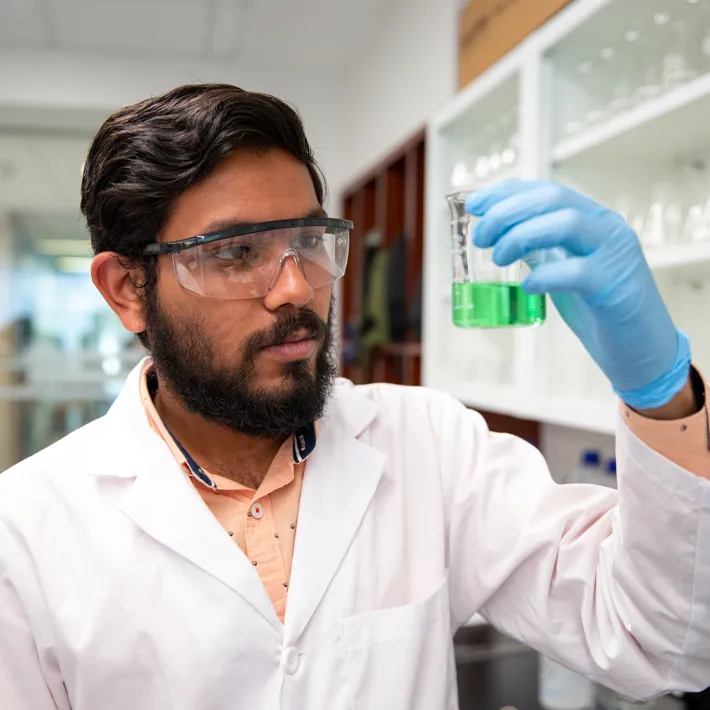
Graduates may find employment as chemical laboratory technologists in a range of settings including, research laboratories, government agencies, educational institutions and technical sales, and in industries such as pharmaceutical and bio-technology, cosmetics and consumer health products, petroleum, mining, water and wastewater, solid waste, environmental protection, energy and food science.
Career positions may include, but are not limited to: analytical technician, bio-chemistry technician, biological lab technician, chemical analyst or lab technician, formulation technician, pilot plant technician, quality control technician, validation and documentation technician, laboratory services following ISO 17025 standards.
Pathways
Transfer to Programs within Ontario
- Bachelor of Science Honours Chemistry - Applied Chemistry Stream (General Ontario Pathway)
- Bachelor of Technology - Manufacturing Engineering Technology
Want to see more Ontario transfers? Visit ONTransfer.ca.
Transfer to Programs outside of Ontario
- Bachelor of Science in Environmental Studies
- Bachelor of Science in Environmental Practice
- Bachelor of Arts in Environmental Practice
Co-op
About Co-op
Students in this program have the opportunity to gain valuable work experience by applying classroom learning during co-op experiences.
Learn more about co-op terms and the roles and responsibilities of students and co-op advisors.
More Information
Empowering Women to Lead in Tech & Trades
Our Women in Technology & Trades (WiTT) is a vibrant community dedicated to empowering women to thrive in tech and trades. Through mentorship, industry connections, and skill-building programs, WiTT breaks down barriers and fosters an inclusive environment where women can confidently pursue their passions and careers.
Together, we’re shaping a diverse and dynamic future.
Learn more about WiTT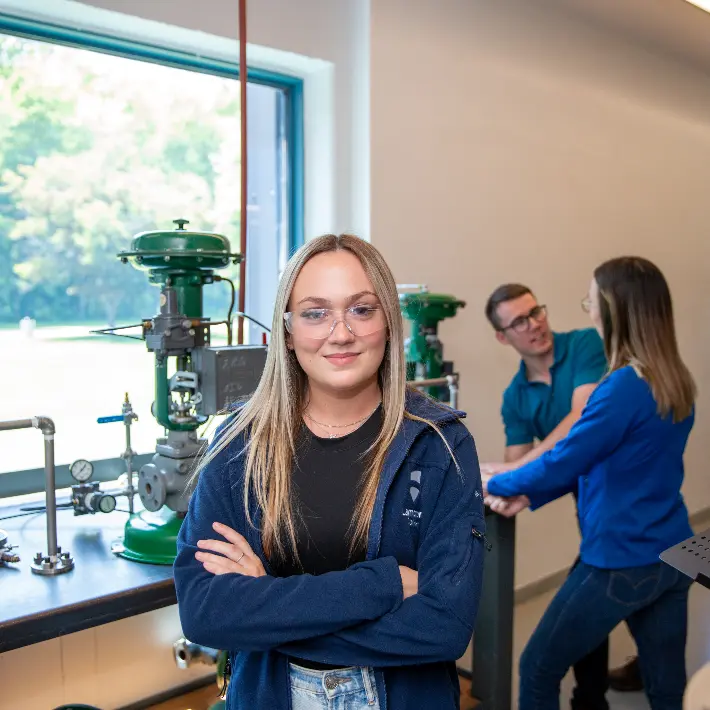
Technology Requirements
It is recommended that students purchase a laptop with a Windows operating system.
Internet Speed Requirements
For best performance for students learning remotely, an internet connection with a minimum of 40 Mbps download and 10 Mbps upload speed is recommended in order to effectively use video conferencing and remote lecture delivery software as well as, other online resources remotely. Due to the large area over which students may be dispersed, we are unable to recommend a specific provider, so you will need to inquire around your area to find one that best suits your needs.
Minimum Laptop Requirements
In order to access the internet and virtually-delivered software and courseware, student laptops should include the following at a minimum. By meeting the following specifications, students will be equipped to access software and courseware on their laptop through the internet:
- Intel i5 8th Gen Processor or equivalent
- 16 GB of RAM (with a minimum of 8 GB)
- 100 GB HDD or more
- HD Graphics
- Webcam with a microphone
- Wireless 802.11n/ac 5ghz capable
- Windows Operating System (Windows 11)
Please note that Chromebooks and MacBooks may not support all software required for your program; students should verify compatibility with their professors.
Software
To ensure students are getting the most our of their classroom experience, some software will be required.
Lambton College has made this software easily accessible online. Students can leverage our Microsoft Office 365 software packages and services. In addition, much of the software you require for your courses will be available on demand for use on any device - on or off campus.
